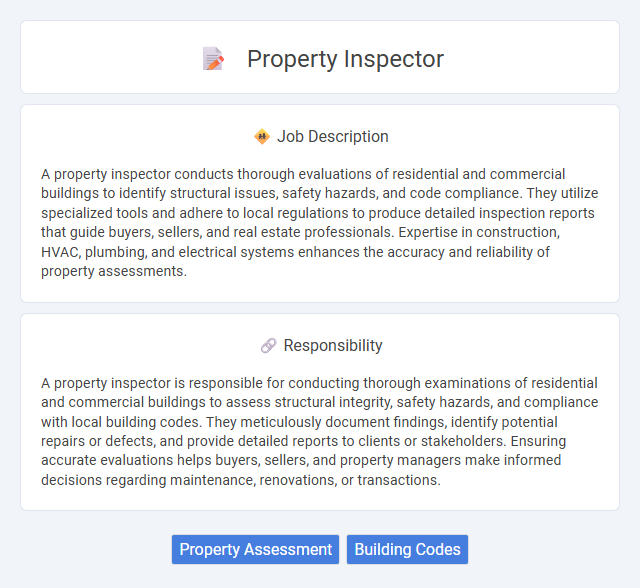
A property inspector conducts thorough evaluations of residential and commercial buildings to identify structural issues, safety hazards, and code compliance. They utilize specialized tools and adhere to local regulations to produce detailed inspection reports that guide buyers, sellers, and real estate professionals. Expertise in construction, HVAC, plumbing, and electrical systems enhances the accuracy and reliability of property assessments.
Individuals with strong attention to detail, good observational skills, and physical stamina are likely suitable for a property inspector role. Those comfortable with inspecting various building conditions, navigating different environments, and communicating findings clearly may find this job aligns well with their abilities. People prone to allergies, claustrophobia, or limited mobility might face challenges in performing property inspections effectively.
Qualification
Property inspectors must possess a combination of formal education and practical experience, often requiring a high school diploma or equivalent, alongside specialized training in building codes, construction practices, and safety standards. Certification through recognized bodies such as the International Association of Certified Home Inspectors (InterNACHI) or the American Society of Home Inspectors (ASHI) enhances credibility and demonstrates proficiency. Strong analytical skills, attention to detail, and knowledge of local regulations are essential qualifications for accurately assessing property conditions and identifying potential issues.
Responsibility
A property inspector is responsible for conducting thorough examinations of residential and commercial buildings to assess structural integrity, safety hazards, and compliance with local building codes. They meticulously document findings, identify potential repairs or defects, and provide detailed reports to clients or stakeholders. Ensuring accurate evaluations helps buyers, sellers, and property managers make informed decisions regarding maintenance, renovations, or transactions.
Benefit
Property inspectors are likely to benefit from a steady demand for their expertise as homeowners and buyers increasingly seek thorough evaluations before transactions. This role often provides flexible work hours and opportunities for self-employment, enhancing work-life balance. The growing awareness of property safety and maintenance issues may further increase job stability and income potential.
Challenge
Property inspector jobs probably involve identifying potential issues in various types of buildings, which can be challenging due to the complexity of construction materials and techniques. Inspectors may face difficulties ensuring compliance with diverse local codes and regulations, increasing the likelihood of encountering unexpected problems. The necessity to stay updated with evolving standards and technologies might further complicate their ability to provide accurate assessments consistently.
Career Advancement
Property inspectors play a crucial role in real estate by assessing the condition of residential and commercial buildings to ensure compliance with safety and quality standards. Career advancement opportunities often include specializing in areas such as environmental inspections, construction management, or becoming a certified home inspector, which can lead to higher earning potential and increased job responsibilities. Professionals may also progress to supervisory roles, consultancy, or start their own inspection businesses, leveraging their expertise and industry certifications.
Key Terms
Property Assessment
Property inspectors conduct comprehensive property assessments to evaluate structural integrity, identify potential safety hazards, and assess compliance with building codes. They use advanced tools and techniques to detect issues such as moisture intrusion, electrical faults, and foundation problems, providing detailed reports that inform buyers, sellers, and real estate professionals. Accurate property assessment ensures informed decision-making and helps prevent costly repairs or legal disputes in real estate transactions.
Building Codes
Property inspectors ensure compliance with local and national building codes by thoroughly examining residential and commercial structures for safety, structural integrity, and code adherence. They identify violations related to electrical systems, plumbing, fire safety, and construction materials to prevent hazards and ensure legal standards are met. Expertise in interpreting building codes such as the International Building Code (IBC) and National Electrical Code (NEC) is essential for accurate reporting and recommendations.
 kuljobs.com
kuljobs.com